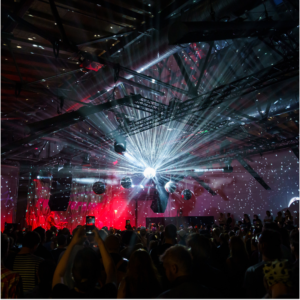19-year-old Flora Lodd examines her generation’s take on five common stereotypes about Germans

Germans DO know how to party: re:publica festival at Station Berlin, 2024.
Picture by: Anne Barth | re:publica | Flickr
Article link copied.
April 4, 2025
Germans are never late and can’t party? Gen Z doesn’t quite agree

Growing up in Germany, stereotypes have always surrounded me – from punctuality to humourlessness. These perceptions stem from history, politics and global impressions. While they might contain a grain of truth, they rarely capture the full picture.
I am 19, based in Berlin and, as part of Gen Z, I see a generation that is more diverse, relaxed and vibrant than the clichés suggest. I want to explore five common stereotypes about Germans to see if they still reflect the reality of modern Germany – especially among my peers.
Harbingers’ Weekly Brief
1. Germans are always on time
The German saying goes, “Better five minutes early than one minute late.” I remember as a child crying if I thought I’d be late for school.
Time has always been a sacred concept in Germany, rooted in the Industrial Revolution and reinforced by figures like Otto von Bismarck (1815–1898), the former chancellor of the German Reich.
However, things are changing. Public transport delays are notorious, leading to thousands of Germans unwillingly being late to work or school and, among my friends, pushing back meetings is normal.
Punctuality still matters – especially out of respect, not just to avoid disrupting our “structured day” – but Gen Z is more relaxed. Have I been late? Yes. And the world didn’t end.
Technology has played a role in this shift too. Messaging apps allow us to quickly update each other, making lateness more acceptable as long as there’s communication.
2. Germans can’t escape their Nazi past
It’s uncomfortable but unavoidable – Germany’s history is deeply tied to the Nazi regime. While older generations still feel the weight of this legacy, I’ve often wondered why our generation is judged by something that happened decades before we were born.
The recent rise of the far-right Alternative for Germany (AfD) party makes this stereotype harder to dismiss. In the February elections, AfD won 20.8% of the vote, double its support from four years ago.
It’s horrifying to see such ideologies gaining traction, but the people I surround myself with reject these beliefs entirely. To me, Germany today is defined by diversity and progress, not its darkest chapter.
Education plays a big part in this – the German school system puts a huge emphasis on teaching history, especially the Holocaust, to ensure younger generations learn from the past.
Social media activism and youth-led movements like Fridays for Future, the international school strike climate campaign initiated by Greta Thunberg, have also helped shape a more politically aware generation.
3. Germans have no sense of humour
Our humour might not be as obvious but it’s there, rooted in self-deprecation
and shared cultural references. The infamous German Weltschmerz (world-weariness) might play a role, along with our love for correcting others.
Still, I’ve laughed countless times with friends over jokes outsiders might not get. Maybe we’re not as funny as we think – but maybe you just need to live here to understand it.
Memes and internet culture have also bridged this gap, creating a humour style among Gen Z that blends German irony with global trends.
4. Germans stop at every red traffic light
Even if the streets are empty, many Germans wait patiently at red pedestrian lights. I was raised to follow rules, and when I first visited England, seeing people cross against the lights felt like a crime. Here, many will turn back if the lights switch to red when they’ve already started crossing the road.
Is it the fear of breaking the law, or the urge to be a good example for other people? Nowadays, I’ll cross if no one’s watching – but there’s always a tiny fear that a hidden police officer will jump out and fine me.
Rule-following is in our DNA, but Gen Z bends the rules more often. This difference might also reflect the urban–rural divide – in bigger cities people are more likely to break small rules, while smaller towns tend to uphold traditions more strictly.
5. Germans can’t party
If Munich’s Oktoberfest is your only impression of German partying, you’re missing out. Berlin’s club scene is world-famous, with endless options from techno temples to house parties. Some of my friends party several nights a week.
Personally, I prefer quieter nights, but the idea that Germans don’t know how to have fun couldn’t be further from the truth, especially in cities like Berlin.
Regional differences play a big role here too, nightlife in rural Bavaria looks very different from Berlin’s 72-hour club marathons. The rise of music festivals and a growing appreciation for international music genres have also reshaped how young Germans experience nightlife.
Written by:

Contributor
Berlin, Germany
Born in 2005, Flora is a high school student from Berlin. Interested in biology and planning to become a researcher in the field of maritime conservation, Flora intends to study abroad, aiming at achieving a master’s degree in marine biology in the United States.
In her free time, Flora plays the piano, bass, acoustic and electric guitars, and drums. When possible, she can also be found surfing and windsurfing.
Edited by:

🌍 Join the World's Youngest Newsroom—Create a Free Account
Sign up to save your favourite articles, get personalised recommendations, and stay informed about stories that Gen Z worldwide actually care about. Plus, subscribe to our newsletter for the latest stories delivered straight to your inbox. 📲
© 2025 The Oxford School for the Future of Journalism



